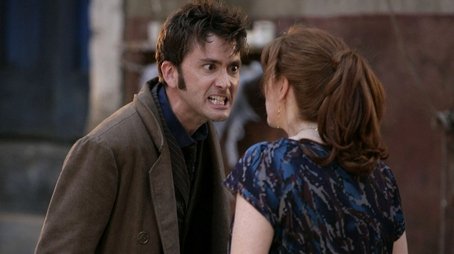
Ask Your Own Question
What is the plot?
The episode begins with the TARDIS materializing in the year 79 AD, in the city of Pompeii, just before the catastrophic eruption of Mount Vesuvius. The Doctor, played by David Tennant, and his companion Donna Noble, portrayed by Catherine Tate, step out into the bustling streets filled with vendors and citizens going about their daily lives. The Doctor is excited to explore the ancient city, but Donna is initially skeptical about the historical significance of their visit.
As they walk through the market, the Doctor notices a strange energy reading and becomes concerned. He senses that something is not right. They encounter a soothsayer named Sybil, who is portrayed as a woman with the ability to see the future. She warns the Doctor that he must make a choice that will affect the fate of many. The Doctor is intrigued but also troubled by the implications of her words.
The Doctor and Donna continue to explore, and they witness a family being treated poorly by a Roman soldier. The Doctor's compassion leads him to intervene, but he is reminded by Donna that they cannot change history. This internal conflict weighs heavily on the Doctor as he grapples with the moral implications of their presence in Pompeii.
They soon discover that the strange energy readings are coming from a nearby quarry. The Doctor and Donna investigate and find a group of stone creatures known as the Pyroviles, who are being awakened by the volcanic activity. The Doctor realizes that the Pyroviles are planning to use the eruption to take over the city and that they must be stopped.
The Doctor decides to confront the Pyroviles, but he is faced with a difficult decision. He knows that if he intervenes, he could save the people of Pompeii, but it would mean altering history. Donna urges him to consider the consequences of his actions, reminding him of the importance of letting history unfold as it should. The Doctor is torn between his desire to save lives and his understanding of the fixed points in time.
As the eruption begins, the Doctor and Donna race against time to stop the Pyroviles. They return to the city and find the soothsayer, who reveals that the Doctor must make a choice: save the people or let history take its course. The Doctor is filled with anguish as he realizes that he cannot save everyone. He ultimately decides to save a single family, the family of a young girl named Caecilius, who he believes can make a difference in the future.
In a climactic moment, the Doctor uses the TARDIS to create a protective barrier around the family, allowing them to escape the destruction of Pompeii. As the volcano erupts, the Doctor and Donna watch from a distance, knowing that they have altered history in a small but significant way. The Doctor is left with a heavy heart, grappling with the weight of his decision and the lives lost in the eruption.
The episode concludes with the Doctor and Donna returning to the TARDIS, where the Doctor reflects on the events that transpired. He expresses his sorrow for the people of Pompeii, acknowledging the pain of having to choose who to save. Donna comforts him, reminding him that they did what they could. They depart, leaving the ruins of Pompeii behind as the TARDIS dematerializes into the time vortex.
What is the ending?
At the end of "The Fires of Pompeii," the Doctor and Donna make the difficult decision to leave Pompeii before the eruption of Mount Vesuvius, despite knowing the fate of the people there. The Doctor saves a family, the Caecilius family, by giving them a chance to escape, but ultimately, he cannot save everyone. As the volcano erupts, the Doctor and Donna watch from a distance, feeling the weight of their choices.
As the episode nears its conclusion, the tension escalates in the bustling streets of Pompeii. The Doctor, portrayed by David Tennant, stands at a crossroads, grappling with the moral implications of time travel. He knows that the eruption of Mount Vesuvius is imminent, and the city will soon be engulfed in ash and fire. The air is thick with the scent of sulfur, and the ground trembles beneath their feet, a foreboding sign of the disaster to come.
The Doctor and Donna Noble, played by Catherine Tate, have just witnessed the devastation that will soon befall the city. They have encountered the Caecilius family, who are central to the story. The father, Caecilius, is a stone merchant, and his family includes his wife, Metella, and their children, including the spirited daughter, Evelina. The Doctor feels a deep connection to them, especially after seeing their kindness and resilience.
In a moment of desperation, the Doctor decides to intervene. He uses his sonic screwdriver to create a distraction, allowing the Caecilius family to escape the impending doom. He tells them to leave the city and head to safety, urging them to take the opportunity to save themselves. The family, confused but trusting, follows his instructions, and they manage to flee just as the first tremors of the volcano begin to shake the ground violently.
As the Doctor and Donna watch the family run away, the sky darkens, and the first plumes of ash begin to rise ominously above the city. The Doctor's face is a mixture of relief and sorrow; he has saved a few, but he knows that countless others will not be so fortunate. Donna, standing beside him, feels the weight of the moment. She understands the gravity of their actions and the pain of knowing they cannot save everyone.
The scene shifts to a panoramic view of Pompeii as the volcano erupts. The ground shakes violently, and the once vibrant city is soon enveloped in a cloud of ash and smoke. The Doctor and Donna stand at a distance, their expressions somber as they witness the destruction. The Doctor's internal conflict is palpable; he is a Time Lord who can change history, yet he is bound by the laws of time that dictate he cannot save everyone.
As the ash begins to fall, the Doctor reflects on the nature of his travels and the heavy burden of his choices. He turns to Donna, who is visibly shaken by the events. They share a moment of silence, understanding the loss of life that is unfolding before them. The Doctor's eyes are filled with regret, knowing that while he has saved a family, he cannot change the fate of the city.
In the final moments, the Doctor and Donna leave Pompeii, stepping back into the TARDIS. The door closes behind them, sealing off the tragedy they have just witnessed. The Doctor's expression is one of deep contemplation, and Donna, still processing the events, looks at him with a mix of empathy and concern. They are both changed by the experience, carrying the weight of the lives lost and the choices made.
As the TARDIS dematerializes, the screen fades to black, leaving the audience with a poignant reminder of the fragility of life and the moral complexities of time travel. The episode concludes with the Doctor and Donna embarking on their next adventure, forever marked by the haunting memories of Pompeii.
Is there a post-credit scene?
In "The Fires of Pompeii," there is no post-credit scene. The episode concludes with the Doctor and Donna Noble leaving Pompeii just before the eruption of Mount Vesuvius. The focus remains on the emotional weight of their actions and the consequences of time travel, rather than any additional scenes after the credits. The episode ends on a poignant note, emphasizing the Doctor's internal conflict about saving individuals versus the larger course of history.
What is the significance of the Pyroviles in 'The Fires of Pompeii'?
The Pyroviles are a race of beings that are made of volcanic rock and are central to the plot of 'The Fires of Pompeii'. They are revealed to be manipulating the events in Pompeii, using the volcanic eruption to their advantage. Their presence raises questions about the morality of intervention, as they are portrayed as a threat to the people of Pompeii.
How does the Doctor's decision to save a family impact the story?
The Doctor's decision to save the family of Caecilius, a local merchant, becomes a pivotal moment in the episode. He struggles with the moral implications of saving individuals versus allowing the natural course of history to unfold. This internal conflict highlights his character's compassion and the weight of his choices, ultimately leading to a resolution where he saves the family while still allowing the eruption to occur.
What role does Donna Noble play in influencing the Doctor's actions?
Donna Noble plays a crucial role in influencing the Doctor's actions throughout the episode. Her strong moral compass and emotional responses challenge the Doctor's initial detachment regarding the fate of Pompeii. She urges him to consider the lives of the people, particularly the family they meet, which leads to a significant change in the Doctor's approach to the situation.
How does the episode depict the relationship between the Doctor and Donna?
The episode showcases the evolving relationship between the Doctor and Donna, emphasizing their growing partnership. Donna's boldness and willingness to question the Doctor's decisions create a dynamic where she acts as both a companion and a moral guide. Their interactions are filled with humor, tension, and emotional depth, illustrating how they complement each other in their adventures.
What is the significance of the prophecy about the 'Daughter of the Gods'?
The prophecy about the 'Daughter of the Gods' is significant as it foreshadows the impending disaster of the volcanic eruption. It serves as a narrative device that connects the characters to the larger fate of Pompeii. The prophecy also highlights the theme of destiny versus free will, as the Doctor grapples with whether to intervene in the course of history or let events unfold as they are meant to.
Is this family friendly?
"The Fires of Pompeii" from Doctor Who's fourth season contains several elements that may be considered objectionable or upsetting for children or sensitive viewers.
-
Destruction and Disaster: The episode revolves around the impending eruption of Mount Vesuvius, which leads to scenes depicting the chaos and panic of the townspeople as they face disaster.
-
Death and Loss: There are moments that highlight the inevitability of death, as the Doctor and his companion, Donna, grapple with the moral implications of their actions in the face of a catastrophic event.
-
Emotional Turmoil: Characters experience fear, desperation, and sorrow, particularly as they confront their fates. This emotional weight may be intense for younger viewers.
-
Violence: While not graphic, there are scenes that depict the struggle for survival and the impact of the volcanic eruption, which may be distressing.
-
Themes of Sacrifice: The episode explores complex themes of sacrifice and the value of life, which may provoke deeper emotional responses.
These elements contribute to a narrative that, while rich in storytelling, may require parental guidance for younger audiences.











